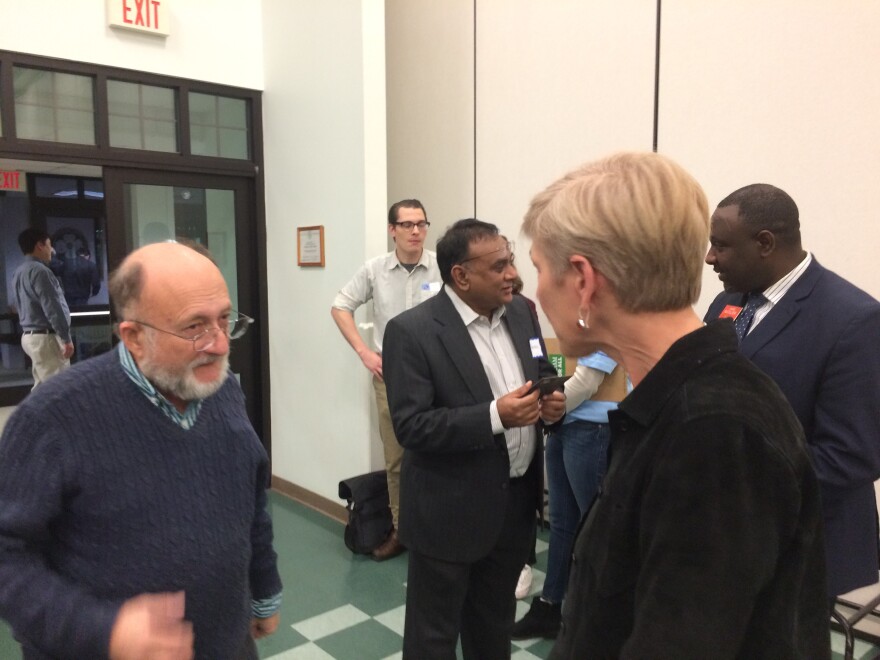Not too long ago, a Democratic primary in North Carolina's 2nd Congressional District was little more than an exercise in futility: picking a candidate to run a losing campaign against an entrenched Republican incumbent.
But a redrawing of the once-solidly GOP district virtually guarantees this year's Democratic primary on March 3 will produce the eventual winner in the general election.
In September, a state court panel ruled North Carolina's legislative districts had been drawn by the Republican-controlled General Assembly with excessive and unconstitutional partisan bias.
That landmark ruling eventually led to the redrawing of the state's congressional districts, which had produced a 10-3 split favoring Republicans in an otherwise evenly divided, purple state.
Before being redrawn, Republican mapmakers had gerrymandered the 2nd district by taking a left-leaning sliver of Wake County and attaching it to more conservative areas such as Franklin and Harnett counties.
"Now, if you look at it, it is exclusively a Wake County district," said Meredith College Political Science Prof. David McLennan. "There is no more Franklin County, no more Nash County."
"So I think Democrats are just in a good spot and Republicans see the handwriting on the wall, saying, 'Why run a campaign, spend a lot of money on a race that you're not likely to win’," he added.
Indeed, without the safe haven created by the old district, GOP Rep. George Holding opted not to run for reelection. That’s the same choice made by U.S. Rep. Mark Walker after his 6th Congressional District was redrawn in a way that favors Democrats.

"We need not to drop the ball because it's still possible to have a Republican challenger and there's still pockets that are heavily conservative in the district," said Robert Hyman, 72, a retiree and a resident of the 2nd Congressional District, who attended the Western Wake Dems Candidate Forum, at the Cary Senior Center, on Jan. 28.
In fact, in the general election, the eventual Democratic nominee will face little-known Republican and Libertarian candidates, Alan Swain and Jeff Matemu, respectively, who do not face primaries.
"There has to negotiated prices for medication," Hyman told Deborah Ross, at the candidate forum, explaining his concerns about health care costs.
"Absolutely," Ross responded.
Ross spent 10 years in the North Carolina General Assembly as a state representative and served as director of the North Carolina chapter of the American Civil Liberties Union. She also ran a respectable, but unsuccessful, statewide race for the U.S. Senate against Richard Burr in 2016.
Ross told the potential voters at the candidate forum in Cary that she has always worked for equality, justice and progress.
"Everything from the South's first anti-racial profiling bill to same-day voter registration at early voting sites," she said.
Another candidate with a solid record of public service is Monika Johnson-Hostler, executive director of the North Carolina Coalition for Sexual Assault and a third term member of the Wake County School Board.
According to recent federal elections data, Johnson-Hostler has raised upwards of $95,000 to Deborah Ross's more than $300,000.
"I don't have the money that we need to run a congressional race," Johnson-Hostler said. "But what I do have is the energy, the tenacity and the perseverance and, quite frankly, relationship-building skills to talk to anybody about everything."
Retail politicking opportunities and forums like the one at the Cary Senior Center are essential for cash-challenged candidates like Johnson-Hostler, especially in a sprint of a primary where many voters are still trying to figure out which newly drawn district they live in.
"I can't keep track of the districts anymore, they just keep moving all over the place," said Bill Ruggirello, who attended the Western Wake candidate forum with his wife, Nancy Jones. She said they used to live in Democratic Congressman David Price's 4th district but now live in the 2nd.
Jones said gerrymandering and constant litigation over districts is bad for democracy.
"It's just too confusing for voters that don't keep up with things and I think it causes them not to come out and vote because they just go 'I don't know even know what's going on anymore,'" she said.

Redistricting battles are not keeping 18-year-old Katherine McCormick from planning to vote this year. Newly registered, McCormick attended the Western Wake candidate forum with her mom and has formed a Young Democrats club at her high school.
"I was really interested in the climate issues," McCormick said. "I think that's probably the biggest issue I'm focusing on when I'm picking who I'm going to vote for."
In addition to Deborah Ross and Monika Johnson-Hostler, McCormick will get to consider two other lesser known--and less well-funded--Democratic candidates: Andy Terrell and Ollie Nelson.









